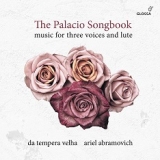Ausgehend von einer Liedsammlung aus dem Madrider Königspalast, die 1890 erstmals veröffentlicht wurde, präsentieren das Vokaltrio Da Tempera Velha und der Lautenist Ariel Abramovitch ein Programm, das den musikalischen Austausch im Europa des 15. Jahrhunderts dokumentiert. Auch ohne Telekommunikation wusste man damals was in Spanien, in Italien, Frankreich oder Flandern musikalisch lief. Man beeinflusste und inspirierte sich gegenseitig.
Dies interpretatorisch exemplarisch darzustellen, ist das große Verdienst der vier Musiker. Die Stimmen von Florencia Menconi (Mezzosopran), Jonatan Alvarado (Tenor) und Breno Quinderé (Bariton) ergänzen sich wunderbar, bilden eine klar und differenziert ausgewogene Einheit, die mit viel Anmut und Poesie diese Renaissance-Chansons vorträgt. In seiner nie aufdringlichen Art ergänzt Ariel Abramovitch dieses feine musikalische Tableau, das viel von Liebe, Sehnsucht und Hoffnung erzählt.
Dabei macht es kaum einen Unterschied, ob es sich um weltliche oder sakrale Musik handelt. Die Wirkung, die hier erzielt wird, ist gleichermaßen intime Expressivität und zarte Lyrik.
Based on a collection of songs from the Royal Palace in Madrid, first published in 1890, the vocal trio Da Tempera Velha and lutenist Ariel Abramovitch present a program documenting the musical exchange in 15th century Europe. Even without telecommunications, people knew what was going on musically in Spain, Italy, France or Flanders. They influenced and inspired each other.
The great merit of the four musicians is to present this in an exemplary way. The voices of Florencia Menconi (mezzo-soprano), Jonatan Alvarado (tenor) and Breno Quinderé (baritone) complement each other wonderfully, forming a clearly and differentiatedly balanced unit that performs these Renaissance chansons with much grace and poetry. In his never obtrusive manner, Ariel Abramovitch complements this fine musical tableau, which tells much of love, longing and hope.
It makes little difference whether the music is secular or sacred. The effect achieved here is equally intimate expressivity and tender lyricism.
























